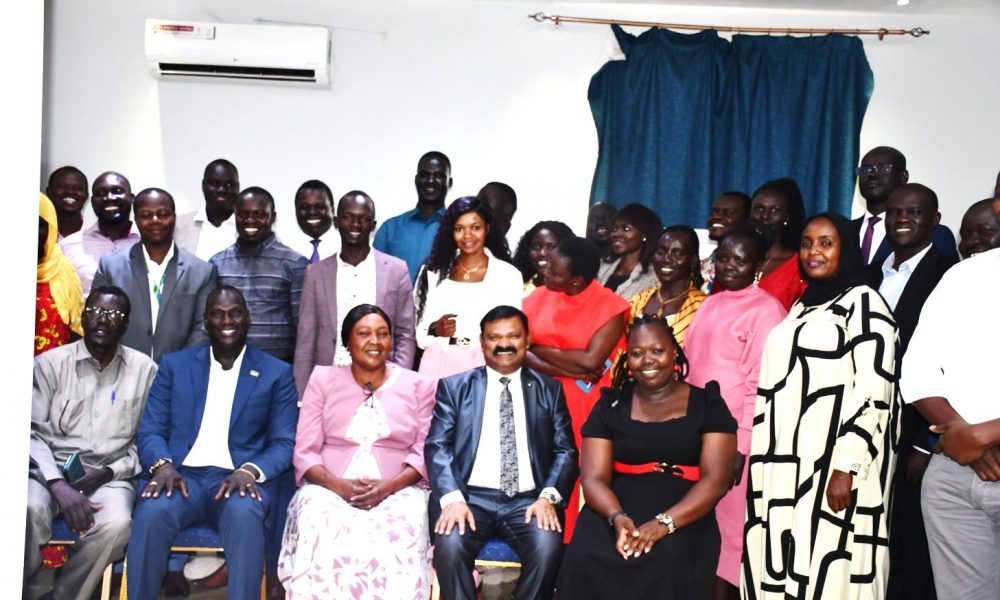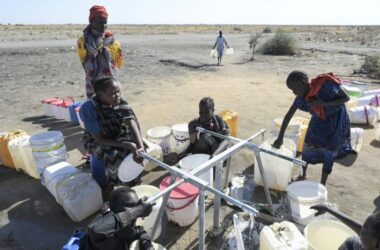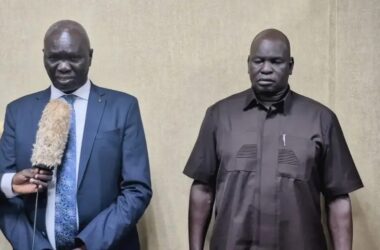By William Madouk
East African Business Council (EABC) has embarked on a 2-day training for members of the business community in South Sudan on African Continental Free Trade Area (AfCFTA) protocols.
The sensitization workshop held in Juba aimed at promoting intra-African trade by raising awareness of AfCFTA.
It was attended by 48 business people in agribusiness, manufacturing, leather, pharmaceuticals, transport, logistics, fruits, and vegetables.
In her remarks, Christina Peter Jabakana, Director General for Administration from the Ministry of EAC Affairs in Juba, said that the workshop is very important in inspiring and encouraging the South Sudanese private sector to enter the free market via AfCFTA.
“Let’s use this workshop to identify likely challenges the private sector in South Sudan may encounter when starting trading under AfCFTA in order to come up with an effective strategy for resolving them,” said Ms. Jabakana.
She echoed the government’s assurances of creating a conducive business environment for the vibrant private sector in South Sudan, which would drive the national economy and contribute to business growth.
Also, the First Vice Chairperson of the South Sudan National Chamber of Commerce, Industry, and Agriculture (SSNCCIA), John Lual Akol Akol, stated that AfCFTA would bring a lot of fortune.
“Implementation of the AfCFTA Agreement comes with benefits and challenges that have implications for businesses, which makes it very critical for the private sector to be aware,” he said.
He also appealed to the South Sudanese government to ratify the AfCFTA agreement in order to give the country legal status and become a party state to the intra-African trade deal.
“The AfCFTA provides an expanded market of 1.3 billion and 3.4 trillion combined GDP to South Sudan products in addition to the EAC market, of which South Sudan is a member,” Akol added.
Mr. Adrian Njau, Trade and Policy Advisor with EABC, said the AfCFTA provides special market access for Burundian products to the whole African market, which will enable South Sudan to diversify its imports and exports.
He challenged the South Sudanese private sector to get ready for the opportunities and challenges presented by a wider market.
He stressed that, given that this week President Salva Kiir will become the Chairperson of the EAC, which gives more responsibilities to the country in terms of the implementation of the EAC and AfCFTA commitments.
“As the government of the Republic of South Sudan prepares to implement EAC and AfCFTA commitments, it is the role of the private sector to actualize these commitments by starting trading under EAC and AfCFTA trade arrangements,” said Njau.
He lauded the South Sudan National Chamber of Commerce for teaming up with EABC to convene the workshop.
The training covered the AfCFTA Trade in Goods Protocol and its annexes (Rules of Origin, Tariff Concession, and Non-Tariff Barriers) and its implications for businesses in the EAC bloc.
Currently, the EAC Trade and Investment Statistics indicate that South Sudan’s merchandise total trade increased to USD 443.6 million in 2022 from USD 216.7 million in 2021.
While the trade balance deteriorated to USD 436 million in 2022 from USD 147.1 million in 2021,
South Sudan’s main merchandise exports include crude oil, wood, and minerals; the main imports into the country comprise food products, petroleum products, and household consumer goods.
EAC Regional Economic Communities (RECs)’ continue to be the major export destinations, while China and the EU remain the dominant source markets.
As such, EAC total trade increased by 13.4 percent to US$74,030.9 million in 2022 from US$65,268.9 million in 2021.
In 2022, EAC total exports to the rest of the world (RoW) were valued at US$20,139.4 million, and EAC total imports from the RoW amounted to US$53,891.48 million, thereby recording a trade deficit of negative US$33752.1 million in 2022.
Total intra-EAC trade grew by 11.2 percent to US$10,910.9 million in 2022 from US$9,810.4 million in 2021, whereas the percentage share of intra-EAC trade in EAC total trade stood at 15 percent in 2022.
In 2022, intra-EAC exports amounted to US$6,366.27 million, while intra-EAC imports amounted to US$4,544.63 million.
The major intra-EAC traded products are cereals, cement, iron and steel, live animals, petroleum products, sugar, foods, and beverages.




